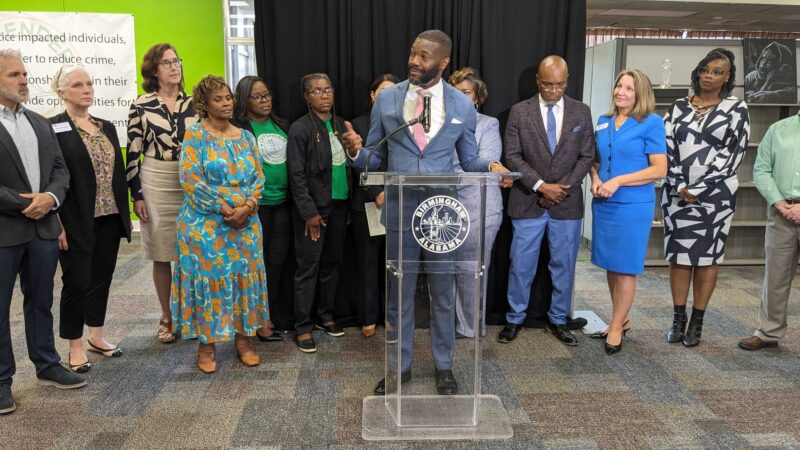U.S. Education Secretary Arne Duncan Talks About Fixing No Child Left Behind Law
Congress has been haggling over re-authorization of the No Child Left Behind education law for more than six years. Still, they can’t agree. In a few weeks, Congress could again take up debate on the law that’s supposed to ensure ALL school children get a good education. WBHM’s Sherrel Wheeler Stewart talks with U.S. Education Secretary Arne Duncan about education and the hurdles in passing the law this year. Here are excerpts from the interview.
Current Status on reauthorization of the No Child Left Behind Law
The No Child Left Behind Law is fundamentally broken. We hope Congress fixes it. Unfortunately, Congress has been pretty broken – pretty dysfunctional for a while. But I think we have the best chance in the six and half years we’ve been in Washington to get it done. The Senate is making a good faith effort to try to work in a bipartisan way. They have a long way to go. The House much less so, but we are hopeful they will do the right thing for children, for families, and ultimately for our nation.
What needs fixing in the No Child Left Behind Law?
First of all, it is so important to us that we get early childhood education in there. We feel that is the best investment we can make. Secondly, this is ultimately and fundamentally a civil rights law. It came out of 1965. It is very important that we make sure whether it is children of color, children with disabilities, children living below poverty, we are giving the best education to every single child.
Testing students in public schools
Some places over-test. We are very clear in the reauthorization that we want to see a cap on the amount of time that states do test, and if states go over that they would have to explain to the public why. We’d actually like to put some money behind states that are reducing testing. At the same time. we feel that it is very important that students be assessed annually and that children and their parents know what their strengths are and how to build upon that and what their weaknesses are and how you improve there.
Provisions in proposed reauthorization that could benefit Alabama’s students
We would love to see more money for poor children – Title I dollars – that could be a potential benefit. We want to make sure that all children are being taught to high standards. Ultimately the goal is to increase high school graduation rates and decrease dropout rates and to make sure that more of our graduates are truly prepared to be successful in college.
Reducing the need for remediation of graduates who go on to college
We need high standards– not standards that have been dummied down. Too many graduates have to take remedial classes. That’s absolutely unfair to them, and it’s unfair to taxpayers. We have to have a high bar there, and that would benefit children, not just in Alabama, but throughout the nation.
The biggest hurdle so far in getting reauthorization of the education law
Congress has been dysfunctional for a long time. It makes me sad. The positive thing is that if they want to start to work together in a more bi-partisan way, there is no better place to do than around education.
Voters’ role in improving education
The biggest thing is that we go into the voting booth with this at the top of your minds. There are no politicians that run against education. There are no anti-education candidates. They love to kiss babies, but far too few walk the walk. They love the photo opps, but can they deliver. Is this candidate willing to hold themselves accountable for increasing education opportunities for all of children? If we had more people voting with that in mind, our nation would be stronger and our children would be better served.
New pilot program will offer housing, resources to people leaving prison
The Birmingham Reentry Alliance will provide wrap around services to dozens of men and women adjusting to life after prison.
A New Orleans garden paid hundreds of dollars in fees for a sewer that doesn’t exist
Galvez Garden owner Lissie Stewart has been fighting the New Orleans Sewerage and Water Board over inaccurate billing for years.
Alabama coal mine keeps digging after hundreds of fines and a fatal explosion
Following the death of a grandfather, Crimson Oak Grove Resources has left a community afraid for their homes and lives. An expert warns one resident may need to evacuate her home while she still can.
Florida’s 6-week abortion ban will have a ‘snowball effect’ on residents across the South
Abortion rights advocates say the ban will likely force many to travel farther for abortion care and endure pregnancy and childbirth against their will.
Attitudes among Alabama lawmakers softening on Medicaid expansion
Alabama is one of ten states which has not expanded Medicaid. Republican leaders have pushed back against the idea for years.
Birmingham is 3rd worst in the Southeast for ozone pollution, new report says
The American Lung Association's "State of the Air" report shows some metro areas in the Gulf States continue to have poor air quality.







